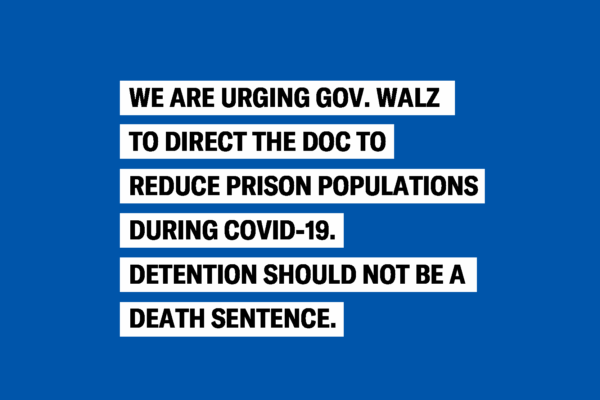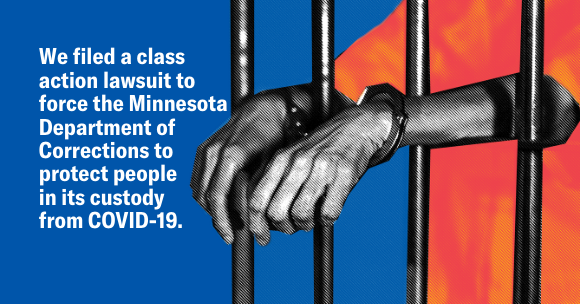Aaryana Malcolm got so weak from COVID-19, other inmates at the Waseca federal women’s prison had to help her eat, shower and fill out requests for medical attention – requests that were ignored, even though she was coughing up blood and vomiting.
By the time the prison got Aaryana to the hospital, her oxygen level was 74 and the doctor said, “My friend, I have to paralyze you and put you on a ventilator or you are going to die.” Aaryana spent 10 days in the hospital. When she returned to Waseca, she had to sleep on the floor. Two months later, she is still sick.
Her situation at the low-security Federal Correctional Institution in Waseca, where COVID-19 has spread like wildfire, was completely avoidable. One positive test in August led to 439 inmates contracting the virus in just three months – a staggering 70% of inmates. That’s according to a lawsuit filed by the ACLU of Minnesota and Ballard Spahr LLP Wednesday in U.S. District Court in Minnesota.
The lawsuit alleges that Waseca prison Warden M. Starr and Director of the Federal Bureau of Prisons Michael Carvajal are refusing to release medically vulnerable people with conditions including autoimmune diseases, diabetes, asthma, hypertension and obesity to ensure their safety from COVID-19, which would decrease the prison population and make social distancing possible. They’re also failing to provide adequate health care or sanitation.
“The Bureau of Prisons has failed to respond in any meaningful way to the pandemic, leading to uncontrolled outbreaks at several facilities, including FCI-Waseca,” said ACLU-MN staff attorney Clare Diegel. “Refusing to release medically vulnerable people who are at the most risk from COVID-19, and instead packing them into bunks just a few feet apart, is no way to handle a highly infectious and deadly virus. The Bureau of Prisons is failing to act with either common sense or humanity.”
The lawsuit seeks emergency orders requiring: the immediate transfer of the most medically vulnerable individuals to home confinement; immediate implementation of social distancing and hygiene measures; and adequate medical care for those still suffering from COVID-19 even after the BOP has declared them “recovered.”
“The circumstances these individuals have been put in are a travesty of how a prison should treat its inmates. We need immediate action to rectify this deplorable situation and to prevent this situation from arising again,” said Wally Hilke, who is part of the pro bono team at Ballard Spahr with attorneys Jonathan M. Bye, Leita Walker and Daniel C. Fanaselle.
“So many of the vulnerable prisoners in Waseca are serving sentences they would not receive today in any humane sentencing system,” said Professor JaneAnne Murray, director of the University of Minnesota Law School Clemency Project, whose students assisted in researching this lawsuit. “The BOP had a chance to release a large portion of them to home confinement and failed to do so. Hopefully, in addition to the global action the ACLU seeks, this lawsuit causes judges to use their power to grant individual prisoners compassionate release.”
#30#
Documents
Related Content

ACLU-MN & 34 Organizations Ask Governor to Order Release of Inmates During COVID Crisis

ACLU-MN Files Lawsuit to Protect People in Minnesota Prisons from COVID-19

ACLU-MN and Legal Clinics Sue to Stop MNDOC From Reincarcerating People at High COVID-19 Risk

Judge Rules ACLU-MN'S Case Against MNDOC’S Lax Handling of COVID-19 Can Move Ahead
Stay Informed
Sign up to be the first to hear about how to take action.
By completing this form, I agree to receive occasional emails per the terms of the ACLU’s privacy statement.
By completing this form, I agree to receive occasional emails per the terms of the ACLU’s privacy statement.
